France and Germany agree on EU treaty changes
Sarkozy and Merkel back modifications at meeting where they also agree to stop arguing in public about ECB’s role.

France has agreed to Germany’s efforts to change European Union treaties to improve governance of the eurozone.
French President Nicolas Sarkozy said on Thursday that proposals for modifying the treaties would come in the next few days.
The announcement came after he and the German Chancellor Angela Merkel held their first talks with Italian Prime Minister Mario Monti since he took over the job from media billionaire Silvio Berlusconi.
France and Germany also agreed to stop arguing in public over whether the European Central Bank should do more to rescue the eurozone from a deepening sovereign debt crisis.
Sarkozy and Merkel said after talks with Monti that they trusted the independent central bank and would not touch its inflation-fighting mandate when they propose the changes of the EU’s treaty to achieve closer fiscal union.
They also demonstrated their confidence in Monti, an unelected technocrat, to surmount Italy’s daunting economic challenges, in contrast to the barely concealed disdain they showed for Berlusconi.
“We all stated our confidence in the ECB and its leaders and stated that in respect of the independence of this essential institution we must refrain from making positive or negative demands of it,” Sarkozy told a joint news conference in the eastern French city of Strasbourg.
Decisive action
French ministers have called repeatedly for the central bank to intervene decisively to counter a market stampede out of euro zone government bonds, while Merkel and her ministers have said the EU treaty bars it from acting as a lender of last resort.
Sarkozy said Paris and Berlin would circulate joint proposals before a Dec. 9 EU summit for treaty amendments to entrench tougher budget discipline in the 17-nation euro area.
Merkel said the proposals for more intrusive powers to enforce EU budget rules, including the right to take delinquent governments to the European Court of Justice, were a first step towards deeper fiscal union.
But she said they would not modify the statute and mission of the central bank, nor soften her opposition to issuing joint euro zone bonds, except perhaps at the end of a long process of fiscal integration.
French aides had hoped Berlin would relent in its opposition to a bigger crisis-fighting role for the ECB after Germany itself suffered a failed bond auction on Wednesday, highlighting how investors are wary even of Europe’s safest haven.
“There is urgency (for ECB intervention),” Foreign Minister Alain Juppe told France Inter radio before the meeting.
Sarkozy took a step towards Merkel this week by agreeing to amend the treaty to insert powers to change national budgets in euro area countries that go off the rails.
Juppe cautioned that treaty change could take years because of the need for 27 national parliaments to ratify it.
With contagion spreading fast, a majority of 20 leading economists polled by Reuters predicted that the euro zone was unlikely to survive the crisis in its current form, with some envisaging a “core” group that would exclude Greece.
Analysts believe that sense of crisis will in the end force dramatic action. “I think we are moving closer to a policy response probably, which could be either more aggressive ECB action or the idea of euro bonds could gain some traction,” said Rainer Guntermann, strategist at Commerzbank.
Resistance
In signs of public resistance to austerity in two southern states under EU/IMF bailout programmes, riot police clashed with workers at Greece’s biggest power producer protesting against a new property tax, and Portuguese workers staged a 24-hour general strike.
Credit ratings agency Fitch downgraded Portugal’s rating to junk status, saying a deepening recession made it “much more challenging” for the government to cut the budget deficit, highlighting a vicious circle facing Europe’s debtors.
German bonds fell to their lowest level in nearly a month after Wednesday’s auction, in which the German debt agency found no buyers for half of a 6bn euro 10-year bond offering at a record low 2.0 per cent interest rate.
The shortage of bids drove Germany’s cost of borrowing over 10 years to 2.2 percent, above the 1.88 per cent markets charge the United States and the 2.18 per cent that heavily indebted Britain has to pay.
Bond investors are effectively on strike in the euro zone, interbank lending to euro area banks is freezing up, ever more banks are dependent on the ECB for funding, and depositors are withdrawing increasing amounts from southern European banks.
In one possible response, people familiar with the matter said the ECB is looking at extending the term of loans it offers banks to two or even three years to try to prevent a credit crunch that chokes the bloc’s economy.
Monti repeated Italy’s goal of achieving a balanced budget by 2013 but said there was room for a broader discussion about how fiscal targets could be adjusted in a worse-than-expected recession.
Italian bond yields’ jumped this month to levels above 7 per cent widely seen as unbearable in the long term, despite stop-go intervention by the ECB to buy limited quantities, triggering Berlusconi’s fall.
Keeping Italy solvent and able to borrow on capital markets is vital to the sustainability of the euro zone. Key Italian bond auctions early next week will test market confidence.